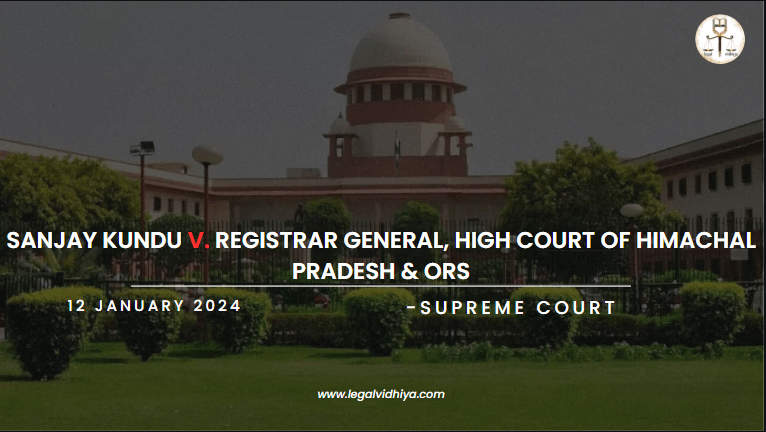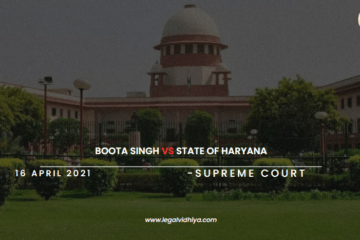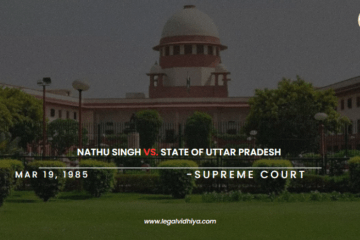
| BENCH | Dr. Dhananjaya Y Chandrachud*, CJI, J B Pardiwala and Manoj Misra, JJ. |
| APPELLANT | Sanjay Kundu |
| RESPONDENT | Registrar General, High Court of Himachal Pradesh & Ors |
| COURT | Supreme Court of India |
| DATE | 12 January 2024 |
Introduction
The case of Sanjay Kundu v. Registrar General, High Court of Himachal Pradesh & Ors revolves around complex legal and procedural issues concerning the administration of justice, particularly in the context of allegations against a high-ranking police officer. This Special Leave Petition (SLP) No. 550-551 of 2024, which came before the Supreme Court of India, stemmed from proceedings initiated in the High Court of Himachal Pradesh. The proceedings were triggered by serious allegations made by a complainant via email to the Chief Justice of the High Court, accusing the petitioner, Sanjay Kundu, who held the position of Director General of Police (DGP) in Himachal Pradesh, of misusing his official position.
The petitioner’s alleged intervention in a civil dispute and purported use of his official authority to intimidate the complainant raised concerns about procedural justice and the fair conduct of investigations. The High Court, upon receiving the complaint, suo motu registered a Criminal Writ Petition, directing the petitioner and other relevant authorities to be moved from their positions to ensure a fair investigation. However, the petitioner was neither made a party to the proceedings nor given an opportunity to present his side before the High Court issued its order on December 26, 2023.
This case delves into several key legal principles, including the doctrine of audi alteram partem (the right to be heard), the scope of judicial intervention in administrative matters, and the disciplinary jurisdiction over public servants. The Supreme Court’s intervention became necessary to address the alleged miscarriage of procedural justice and to determine the legality and validity of the High Court’s directives.
The intricate legal arguments presented by both parties, coupled with the complexities of administrative procedures and the gravity of the allegations, make this case significant in the realm of Indian jurisprudence. The Supreme Court’s judgment provides insights into the balance between the powers of the judiciary and administrative authorities, ensuring fairness and due process in the administration of justice
Facts
- The case originated from an email sent by a complainant to the Chief Justice of the High Court of Himachal Pradesh, alleging misuse of official position by Sanjay Kundu, who served as the Director General of Police (DGP) in Himachal Pradesh. The complainant’s email detailed threats and intimidation allegedly orchestrated by individuals connected to the petitioner.
- Upon receiving the complaint, the High Court of Himachal Pradesh suo motu registered a Criminal Writ Petition based on the email allegations. The court directed the petitioner, along with other relevant authorities, to be moved from their positions to ensure an impartial investigation. This directive was issued without affording the petitioner an opportunity to present his side or participate in the proceedings.
- The complainant accused Sanjay Kundu of intervening in a civil dispute and attempting to use his official authority to intimidate and harass the complainant. These allegations were serious and formed the basis of the High Court’s order issued on December 26, 2023.
- The petitioner, Sanjay Kundu, was not made a party to the proceedings before the High Court and was not given an opportunity to respond to the allegations leveled against him. The High Court’s order directing the petitioner’s transfer and the initiation of investigations was issued ex parte, without affording him due process.
- Sanjay Kundu challenged the High Court’s order by filing a Special Leave Petition (SLP) before the Supreme Court of India. The petitioner argued that the High Court’s directives lacked procedural fairness and violated fundamental principles of justice, including the right to be heard.
- The Supreme Court heard arguments from both parties, considering the complexities of administrative procedures, disciplinary jurisdiction over public servants, and the doctrine of audi alteram partem (the right to be heard). The court intervened to address the alleged miscarriage of procedural justice and determine the legality and validity of the High Court’s directives.
- The Supreme Court ultimately set aside the High Court’s order directing the petitioner’s transfer but upheld directives related to the formation of a Special Investigation Team (SIT) and the provision of security to the complainant and his family. The court emphasized the importance of due process and fair proceedings in the administration of justice.
Issues raised
- Whether the High Court’s directives, particularly the transfer of the petitioner from the post of Director General of Police (DGP), were issued in accordance with principles of natural justice and procedural fairness?
- Whether the High Court had the jurisdiction to initiate proceedings and issue directives based on an ex parte email complaint without affording the petitioner an opportunity to be heard?
- Whether the High Court’s reliance on status reports and other evidence without providing an opportunity for the petitioner to contest the allegations against him violated his right to a fair hearing?
- Whether the High Court’s order directing the formation of a Special Investigation Team (SIT) and the grant of protection to the complainant were legally valid in the absence of proper procedural safeguards?
- Whether the High Court’s actions, including the transfer of the petitioner and the initiation of investigations, amounted to a manifest miscarriage of procedural justice and violated the petitioner’s constitutional rights?
These questions encapsulate the core legal issues surrounding the case and formed the basis of the Supreme Court’s deliberations and eventual judgment.
Contentions of appellant
- The petitioner contended that the High Court’s directives, particularly the order to transfer him from the post of Director General of Police (DGP), were issued without affording him an opportunity to be heard, thus violating principles of natural justice and procedural fairness.
- It was argued that the High Court lacked jurisdiction to initiate proceedings and issue directives based on an ex parte email complaint, as it failed to provide the petitioner with a fair hearing and the opportunity to present his side of the case.
- The petitioner asserted that the High Court’s reliance on status reports and other evidence without granting him a chance to contest the allegations against him infringed upon his fundamental right to a fair trial and due process.
- It was contended that the High Court’s order directing the formation of a Special Investigation Team (SIT) and the provision of protection to the complainant lacked legal validity due to the absence of proper procedural safeguards and adherence to established legal principles.
- The petitioner argued that the actions of the High Court, including the transfer of the petitioner and the initiation of investigations, resulted in a manifest miscarriage of procedural justice, violating his constitutional rights and statutory entitlements.
Contentions of Respondent
- The respondents contended that the High Court’s intervention was justified based on the serious allegations leveled against the petitioner, who held a high-ranking position as the Director General of Police (DGP), Himachal Pradesh.
- It was argued that the High Court acted within its jurisdiction to ensure a fair investigation into the complaints, considering the gravity of the allegations, including misuse of official position and intimidation tactics allegedly employed by the petitioner.
- The respondents asserted that the High Court’s directives were issued in response to the need for impartiality and transparency in the investigation process, aiming to prevent any undue influence or obstruction of justice.
- It was contended that the petitioner’s objections regarding procedural irregularities were outweighed by the need to protect the integrity of the investigation and uphold public confidence in the justice system.
- The respondents maintained that the transfer of the petitioner and the formation of a Special Investigation Team (SIT) were essential measures to ensure an unbiased inquiry into the allegations, thereby serving the interests of justice and the rule of law.
Judgement
The judgment of the case, delivered by the Supreme Court, addressed several key aspects and considerations. The Supreme Court scrutinized the procedural irregularities surrounding the High Court’s intervention in the matter. It emphasized that while the allegations against the petitioner were serious, the High Court’s ex parte order transferring the petitioner out of the post of DGP without affording him an opportunity to be heard amounted to a manifest miscarriage of procedural justice. The Court underscored that the High Court had improperly assumed disciplinary powers over the petitioner without adhering to the administrative hierarchy governing service matters.
The judgment reiterated the significance of the principle of audi alteram partem, emphasizing that fairness and due process must be upheld even in cases involving serious allegations. It criticized the High Court’s failure to afford the petitioner an opportunity to contest the allegations against him before passing the transfer order, noting that post-decisional hearings lacked the requisite fresh and dispassionate consideration of the merits.
In light of the aforementioned procedural flaws, the Supreme Court directed the High Court to recall its ex parte order and commence fresh proceedings. It emphasized the importance of affording both the petitioner and the complainant an opportunity to present their perspectives before the court. This directive aimed to rectify the procedural deficiencies and uphold the principles of natural justice.
While acknowledging the need for an impartial investigation, the Supreme Court declined to disturb the High Court’s directive to form an SIT. However, it clarified that the SIT’s composition should consist of Inspector General (IG) level officers who would not report to the petitioner for the purpose of the investigation. This measure aimed to ensure the independence and impartiality of the inquiry.
The Supreme Court endorsed the High Court’s directive for the State Government to provide adequate security to the complainant and his family. Additionally, it clarified that since the investigation would be conducted by the SIT, the court refrained from expressing any opinion on the merits of the allegations, emphasizing that they should be duly investigated in accordance with the law.
Regarding cases referred, the judgment may have cited precedent cases such as Maneka Gandhi v. Union of India, A.K. Kraipak v. Union of India, and State of Orissa v. Dr. (Miss) Binapani Dei, related to procedural fairness, administrative law, and the principle of natural justice to support its conclusions. However, specific cases cited would depend on the legal arguments and precedents relevant to the issues raised in the present case
Case Analysis
The case analysis delves into the intricate legal and procedural aspects surrounding the dispute between the petitioner and the High Court of Himachal Pradesh. At its core, the case revolves around allegations of procedural irregularities, violations of natural justice, and the appropriate exercise of judicial and administrative powers.
The analysis begins by scrutinizing the procedural missteps committed by the High Court, particularly its decision to pass an ex parte order without affording the petitioner an opportunity to present his case. This procedural flaw, emphasized by the Supreme Court, underscores the foundational principle of audi alteram partem, which mandates that all parties affected by a decision must have a fair chance to be heard.
Furthermore, the analysis delves into the jurisdictional overreach demonstrated by the High Court in assuming disciplinary powers over the petitioner, a serving police officer, without due regard for the established administrative hierarchy governing service matters. By directing the petitioner’s transfer without adequate procedural safeguards, the High Court encroached upon the domain of executive authority, highlighting the need for judicial restraint and adherence to legal norms.
Moreover, the analysis explores the delicate balance between the need for an impartial investigation and the preservation of individual rights. While acknowledging the seriousness of the allegations against the petitioner, including misuse of official position and intimidation tactics, the Supreme Court underscored the importance of upholding procedural fairness and due process. This necessitated the recall of the ex parte order and the initiation of fresh proceedings, ensuring that both parties have an equitable opportunity to present their arguments.
Additionally, the analysis considers the role of the Special Investigation Team (SIT) in conducting an unbiased inquiry into the allegations. By mandating the inclusion of Inspector General (IG) level officers and insulating them from the petitioner’s influence, the Supreme Court sought to safeguard the integrity and independence of the investigation, thereby fostering public trust in the justice system.
Overall, the case analysis underscores the paramount importance of procedural fairness, legal propriety, and respect for institutional boundaries in safeguarding the rule of law. It serves as a poignant reminder of the judiciary’s pivotal role in upholding constitutional principles and ensuring justice for all parties involved.
Conclusion
In conclusion, the Supreme Court’s verdict in the case of Sanjay Kundu v. Registrar General, High Court of Himachal Pradesh & Ors reaffirmed the fundamental principles of procedural justice and administrative law. The court meticulously examined the procedural irregularities committed by the High Court, particularly its decision to pass an ex parte order without affording the petitioner a fair opportunity to present his case. This breach of natural justice was deemed unacceptable, emphasizing the cardinal principle of audi alteram partem, which ensures that all parties are heard before a decision is made.
Furthermore, the Supreme Court scrutinized the jurisdictional overreach of the High Court in assuming disciplinary powers over the petitioner, a serving police officer, without due regard for established administrative protocols. By directing the petitioner’s transfer without adequate procedural safeguards, the High Court encroached upon the executive domain, highlighting the need for judicial restraint and adherence to legal norms.
The court’s judgment underscored the delicate balance between the imperative of conducting an impartial investigation and safeguarding individual rights. While acknowledging the seriousness of the allegations against the petitioner, the Supreme Court prioritized the principles of procedural fairness and due process. This necessitated the recall of the ex parte order and the initiation of fresh proceedings, ensuring equitable opportunities for all parties to present their arguments.
Moreover, the court emphasized the importance of an independent and unbiased investigation, mandating the formation of a Special Investigation Team (SIT) comprising Inspector General (IG) level officers. By insulating the SIT from the petitioner’s influence and ensuring its autonomy, the Supreme Court sought to uphold the integrity of the investigation process and bolster public trust in the justice system.
Overall, the conclusion of the case reaffirmed the judiciary’s commitment to upholding constitutional values, ensuring adherence to legal principles, and safeguarding the rights of all individuals involved. The judgment served as a resounding affirmation of the rule of law, underscoring the judiciary’s pivotal role in preserving justice, fairness, and accountability in society.
Written by Harshit Yadav an intern under legal vidhiya.
Disclaimer: The materials provided herein are intended solely for informational purposes. Accessing or using the site or the materials does not establish an attorney-client relationship. The information presented on this site is not to be construed as legal or professional advice, and it should not be relied upon for such purposes or used as a substitute for advice from a licensed attorney in your state. Additionally, the viewpoint presented by the author is of a personal nature.




0 Comments